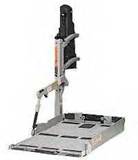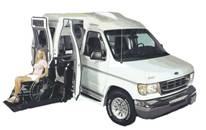Shopping For A Wheelchair Accessible Van?
Read This Page Before Buying.

Help others
making a similar purchase.
View other's advice Share your experience
This webpage is the product of a disabled individual who
has owned both a full size conversion van as well as a mini. Before you
purchase your first wheelchair accessible van (or your third or fourth), I
suggest you take a moment to consider some of the information detailed on this
webpage. I hope it is helpful to you.
My Vehicle Experience
- Height Factor - Lifts
- Kneel Systems
My
Advice - Links - Contact / Questions
My First Vehicle
My
first vehicle was a 1988 Ford full size van. It had a Wheelchair Lift (as
opposed to a ramp). The lift was “heavy duty” and never gave me any trouble. I eventually
began shopping for a new vehicle when my van’s engine wasn’t dependable any
more.
 Prior to my purchase of a Chevy Venture modified by Eldorado National I searched the World Wide Web looking for
information to become a wise consumer but I did not find any editorials about
it. This is an account of one consumer who regrets his purchase, and hopes
other disabled individuals don’t wind up with the same regrets. My minivan
problems did not end until I obtained a lawyer and after several months of
threatening litigation, had Eldorado National agree
to buy my van back from me. Whatever the brand you are looking to purchase,
take a moment to read some of the pros (Full Size Van) and cons (Minivans) of modified
vehicle shopping.
Prior to my purchase of a Chevy Venture modified by Eldorado National I searched the World Wide Web looking for
information to become a wise consumer but I did not find any editorials about
it. This is an account of one consumer who regrets his purchase, and hopes
other disabled individuals don’t wind up with the same regrets. My minivan
problems did not end until I obtained a lawyer and after several months of
threatening litigation, had Eldorado National agree
to buy my van back from me. Whatever the brand you are looking to purchase,
take a moment to read some of the pros (Full Size Van) and cons (Minivans) of modified
vehicle shopping.
Height Factor
I
am 6’ 3” and sit tall in my wheelchair. So I thought I would need a full size
van with a raised roof again. I have been a passenger in my friend’s modified
Dodge Caravan and I had to bend over slightly. The Dodge Caravan has a 10 inch lowered
floor. But when I went shopping I was introduced to the Eldorado National “Activan” (now
called: "Amerivan") which had a 12 inch lowered
floor. I thought this was wonderful. Apparently it was the first
minivan to drop its floor 12 inches. This would give me the extra room I needed
to comfortably see out the windshield while driving from my wheelchair. The
thought of using less gas and having more parking spaces available to me with a
minivan blinded me to the potential headaches to come.
Years
ago, as with my first full size van, modifiers were only able to lower the
floor 6”. So because of my height I needed a lowered floor and a raised roof.
Today modifiers lower the floor 8” and even 9” inches. My current full size
Ford van has an 8” lowered floor. And these extra 2” inches made it possible
for me to order a van without a raised roof (saving thousands of dollars).
Lowered
floors are very expensive (about $10,000.00). If the vehicle is for a
non-driver, there is no need to lower the floor. A raised roof (about $3,000.00
– and about $5,000.00 if you raise the side doors also) should be sufficient. The
reason for the lowered floor is so the driver in the wheelchair can have a safe
view out of the windshield.
Wheelchair Lifts / Ramps
 Other than some general maintenance, I never
experienced any trouble with the hydraulic lift in my full size van in over 15
years of use. On the other hand I had nothing but trouble with the delicate
electric ramp in my mini van. There was one electrical glitch after another. The
small electrical motors used in the ramps are not durable or reliable.
Other than some general maintenance, I never
experienced any trouble with the hydraulic lift in my full size van in over 15
years of use. On the other hand I had nothing but trouble with the delicate
electric ramp in my mini van. There was one electrical glitch after another. The
small electrical motors used in the ramps are not durable or reliable.
After
numerous complaints I had Eldorado National install an
entirely new ramp system in my mini van. The problems continued. Three ramp
motors later - I still had problems.
The
Wheelchair Lifts are much more dependable. Lifts are heavy duty hydraulic
pieces of equipment. I would only recommend lifts to friends and loved ones.
There are also different types of lifts.
Under Vehicle Lifts
 The Under Vehicle Lifts are nice on the full size van
because they do not take up any interior room, but they do affect ground
clearance and they are subject to collecting dirt and debris (which could lead to problems). Curb-side parking is also very difficult with the U.V.L. because upon deployment the lift comes straight out from the side, hitting the curb.
The Under Vehicle Lifts are nice on the full size van
because they do not take up any interior room, but they do affect ground
clearance and they are subject to collecting dirt and debris (which could lead to problems). Curb-side parking is also very difficult with the U.V.L. because upon deployment the lift comes straight out from the side, hitting the curb.
Interior Lifts
The
new interior lifts for full size vans are much more considerate of interior
space. If you do purchase the recommended interior lift, select a "duel
post" model (as pictured on the top of this page).
“Duel Post” means that there are two support brackets inside the vehicle as
opposed to the single post model pictured below. The duel posts provide greater
stability and strength.
 The single post lifts allow clearance for a wheelchair
to roll into the passenger area of the vehicle (one post is toward the rear of the side doors, and there is no post behind
passenger seat). This is a nice feature
if you want the wheelchair in the passenger seat. However after some usage the
lift tends to lean to the one side that is not supported by a post.
The single post lifts allow clearance for a wheelchair
to roll into the passenger area of the vehicle (one post is toward the rear of the side doors, and there is no post behind
passenger seat). This is a nice feature
if you want the wheelchair in the passenger seat. However after some usage the
lift tends to lean to the one side that is not supported by a post.
For
individuals driving from their wheelchairs, there really isn't a need for the
single post lifts.
Kneel Systems
With
a mini van, the rear of the vehicle “kneels” when the ramp deploys so that the
incline is not as steep. This system was temperamental as well in my mini van . The van was supposed to come out kneel mode (rear
shocks fill with air) when the ramp stowed. Frequently my van never came fully out
of kneel mode –causing the van to ride “low”.
This
is just another delicate electrical feature certain to eventually have
problems. With a full size van and lift there is no kneel system involved. This
is yet another benefit to “going full size”.
Van Bottoms Out
The
mini van was so low to the ground that I consistently hit bottom on everything.
Obviously this is more so with the 12 inch lowered floor (as opposed to the
standard 10 inch drop), but all lowered floor minivans are subject to hitting bottom.
The minivans with lowered floors are just too low.
In
fairness, I must say that this is experienced more often with rear seat
passengers on board. If you will mostly be using the mini van for commuting to
work or school you may not experience this problem as often. However, if you
have a family or frequently carry passengers, avoid the mini,
you will bottom out at every driveway, speed bump etc. I frequently picked up 3
or 4 individuals (including a friend in a wheelchair who sat behind me) and I continually
scraped bottom.
My Advice
 Go with a full size van, preferably the Ford E-250.
The ramp on the minivans is just too delicate and temperamental. With a full
size van the lift is heavy duty and made to last. With a full size van there
are no worries about “hitting bottom”. There is plenty of ground clearance with
a full size van.
Go with a full size van, preferably the Ford E-250.
The ramp on the minivans is just too delicate and temperamental. With a full
size van the lift is heavy duty and made to last. With a full size van there
are no worries about “hitting bottom”. There is plenty of ground clearance with
a full size van.
Please
don’t make my mistake. Yes you’ll spend more on gas with a full size, but the
consequences of the alternative are not fun. Also a full size (Ford E-250) is a
truck. Minivans are not . Where I live (North East)
the roads get potholes and it is hard on vehicles. My full size van can take
the abuse. In my mini van I crawled at 5 mph as soon as I saw the slightest
bump for the fear of damaging my delicate little minivan (particularly since
the rear airbags rarely inflated adequately).
My Vehicle Experience
- Height Factor - Lifts
- Kneel Systems
My
Advice - Links - Contact / Questions